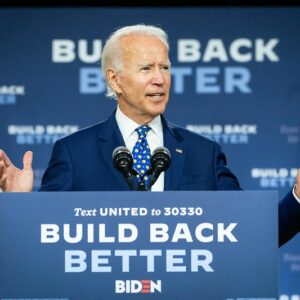As a presidential candidate, Joe Biden promised to be “the most pro-union president you’ve ever seen.”
As president, Biden has taken concrete steps to fulfill that promise. The massive spending bills he has promoted include union-specific set-asides and mandates, like adding additional tax credits for electric vehicles made in union factories. In April, Biden signed an executive order creating a White House task force to promote labor organizing, “an attempt to use the power of the federal government to reverse a decades-long decline in union membership,” according to The New York Times.
And Biden has been a big proponent of the PRO Act, a bill that critics say would end the tradition of “secret ballot” voting on whether or not to unionize. The House passed the PRO Act in March, but it is unlikely to pass the U.S. Senate. Which is why the Biden administration and congressional Democrats have moved some of its key provisions into the Build Back Better spending plan.
The question voters are asking now is whether Biden and his union allies have gone too far.
For example, the Build Back Better plan includes a $7,500 tax incentive that, beginning next year, only applies to electric vehicles (EVs) built in the U.S. That credit goes up another $4,500 if the EV is made in a union shop.
Environmentalists complain the mandate will unnecessarily raise the price of EVs and, as a result, fewer will be sold. Elected officials in states with non-union auto plants complain it is a partisan political reward that unfairly punishes their workers.
“There’s nothing about a union-made electric vehicle that makes it greener than a non-union vehicle, so it just seems pretty obvious it’s funneling money to supporters,” said Republican Sen. John Cornyn of Texas — soon to be home to Tesla’s corporate headquarters. “I think it’s shameful.”
Small businesses are impacted by the union-backed changes to the Build Back Better bill as well.
David Juvet of the New Hampshire Business and Industry Association notes that it includes “egregiously punitive penalties ($50,000 to $100,000) for even the most minor and incidental infractions against the National Labor Relations Act.” That is one of the elements of the controversial PRO Act hidden inside the $2 trillion social spending plan.
It’s an approach that’s not popular with New Hampshire voters. In a recent New Hampshire Journal poll, a whopping 75 percent said they would be less likely to support a candidate who supported imposing those penalties for small infractions — like workplace signage being placed in the wrong area — on small businesses.
And while the Biden administration has made government support for labor unions a priority, New Hampshire voters also said they believe it has gone too far. Asked whether the federal government should do more to promote unions or if it’s doing too much and hurting small businesses, 63 percent of registered voters said the government is hurting business.
“If the Build Back Better bill passes with this PRO Act language in it, you’ll see businesses like mine fined from $50,000 up to $100,000 for even the smallest, often unintentional, violations,” said Kyle Reagan, CEO of DECCO, a Brookline, N.H.-based mechanical contractor. “These fines can be enforced even for things that have nothing to do with working conditions, but rather minor technicalities.
“This type of heavy-handed, Washington, D.C. meddling in our economy’s ‘business’ is exactly what the country does not need,” Reagan added.
With national polls showing more Americans believe Biden’s spending proposals will hurt the economy than help it, passing a Build Back Better package that appears to punish businesses may not be the smart political strategy.

